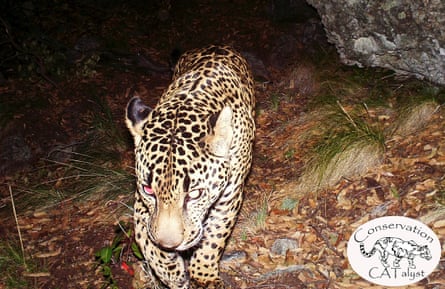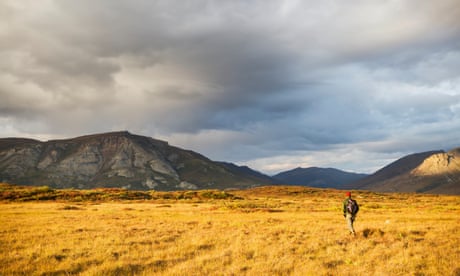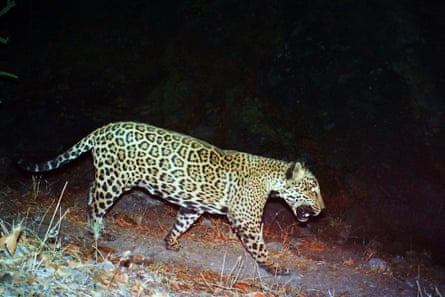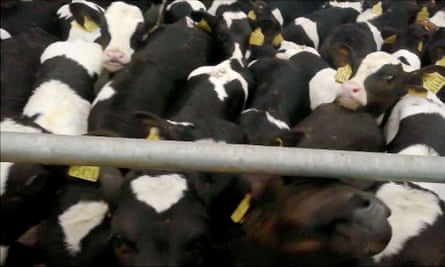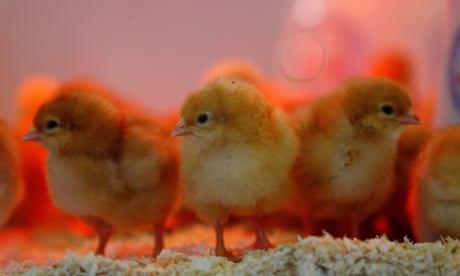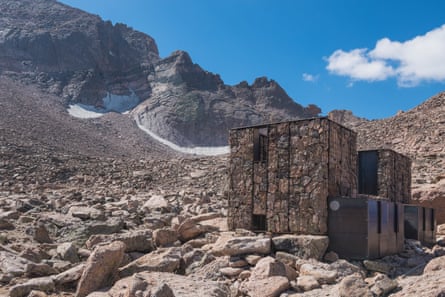
In Colorado, Rocky Mountain national park staff commissioned two new toilets in the Boulder Field area near Longs Peak. Photograph: Courtesy Rick Sommerfeld
With toilets in short supply, ordure can harm streams and wildlife. An entrepreneur has a nifty solution
Supported by
.png)
Grant Stringer
Wed 2 Dec 2020
For 20 years, Richard Lechleitner had a grueling task at Mt Rainier national park: digging human waste out of backcountry toilets and carrying it down the mountains.
Staff at the park in Washington state grappled with an influx of visitors hiking far from roads, along with thousands of climbers attempting to reach the active volcano’s 14,000-foot summit each year. People heeded the call of nature on Mt. Rainier’s pristine glaciers, as well as in its unvarnished wilderness toilets.
“They’d put in these horrible toilets that just smelled terrible,” Lechleitner said. Maintaining them, he found, was appallingly dirty work.
At national parks across the US, from the peaks of Denali in Alaska to desert backpacking destinations in Utah and Arizona, managers have struggled to deal with this inevitable byproduct of people eager to get outdoors, a desire that continues amid the pandemic. Unlike a discarded Clif Bar wrapper, human waste carries a slew of bacteria and pathogens when left unbagged or otherwise unaddressed.
With toilets in short supply, ordure can harm streams and wildlife. An entrepreneur has a nifty solution
Supported by
.png)
Grant Stringer
Wed 2 Dec 2020
For 20 years, Richard Lechleitner had a grueling task at Mt Rainier national park: digging human waste out of backcountry toilets and carrying it down the mountains.
Staff at the park in Washington state grappled with an influx of visitors hiking far from roads, along with thousands of climbers attempting to reach the active volcano’s 14,000-foot summit each year. People heeded the call of nature on Mt. Rainier’s pristine glaciers, as well as in its unvarnished wilderness toilets.
“They’d put in these horrible toilets that just smelled terrible,” Lechleitner said. Maintaining them, he found, was appallingly dirty work.
At national parks across the US, from the peaks of Denali in Alaska to desert backpacking destinations in Utah and Arizona, managers have struggled to deal with this inevitable byproduct of people eager to get outdoors, a desire that continues amid the pandemic. Unlike a discarded Clif Bar wrapper, human waste carries a slew of bacteria and pathogens when left unbagged or otherwise unaddressed.

A backcountry toilet at Camp Muir, a climbing destination at 10,000ft on Washington’s Mt Rainier. Photograph: Kyle Roepke/Courtesy Geoff Hill
Colorado’s Rocky Mountain national park has been hit especially hard. There, a surge in visitors meant toilet paper became a more common sight in wilderness areas, rangers told the Guardian. But the park is now known nationally for pioneering a solution used at other sites, including Mt Rainier.
Between 2016 and 2019, the 265,000-acre park near Denver saw a 40% increase in visitors hiking and climbing its woods and jagged peaks. In 2019, it was the third-most visited national park in the U.S.
Colorado’s Rocky Mountain national park has been hit especially hard. There, a surge in visitors meant toilet paper became a more common sight in wilderness areas, rangers told the Guardian. But the park is now known nationally for pioneering a solution used at other sites, including Mt Rainier.
Between 2016 and 2019, the 265,000-acre park near Denver saw a 40% increase in visitors hiking and climbing its woods and jagged peaks. In 2019, it was the third-most visited national park in the U.S.
More hikers than ever were flocking to Longs Peak, a sheer 14,000ft mountain near the continental divide. The main trail attracts thousands of people each day during the summer, but around the mountain there are just four toilets, spread miles apart. That leaves hikers with limited options.
By 2015, rangers were trekking to the toilets and finding repulsive conditions. At its worst, the solid matter would freeze and thaw repeatedly and rise above the seat. Rangers would have to dig the material from the chamber and load it into a five-gallon bucket, place the cargo on to a pack animal and ride down.
“This is some of the worst work in the world,” said Geoff Hill, a toilet entrepreneur who worked with the park’s rangers as a doctoral student studying backcountry waste.
Because the toilets were in such a sordid state, many hikers probably refused to use them, opting instead to dig a shallow hole or cover their business with a rock.
Human pathogens can sully streams and harm high-altitude denizens, such as marmots. The beaver-like creatures would sometimes become stuck inside the toilet chambers and covered in waste, according to park staff.
Park chiefs poured time and resources into a solution. They settled on a nifty toilet product that Hill designed, called ToiletTech.
The system separates urine from solid waste, which creates cleaner excrement – and less work for rangers. Beneath the toilet seat, excrement lands on a small conveyor belt, while urine flows through a separate pipe and into a septic field. When a visitor presses a foot-powered pump inside the bathroom, ordure travels from the conveyor belt into its own chamber. There, it remains dry, lightweight and free of viruses usually present in a wet barrel of urine-soaked waste.
The new facilities, which replaced the four toilets near Longs Peak, have since helped cut down on solid matter in the area and made rangers’ lives much easier, although 200mph winds once blew the doors off a unit in the Boulder Field area.
Land managers have installed Hill’s toilets across the country to rave reviews, from Angel’s Landing in Utah’s Zion National Park to Terwilliger Hot Springs outside Portland, Oregon, as well as at Mt Rainier.
“If I was to win the lottery, I literally would go out … and buy enough toilets to work in all of the backcountry camps at Mt Rainier,” Lechleitner said of the new design.
But even Hill’s toilets come with drawbacks. Waste from remote areas is still flown out by helicopter, which is expensive. Lechleitner also said the ToiletTech units aren’t cheap, at $4,000 per unit, and National Park System maintenance upgrades are notoriously backlogged.
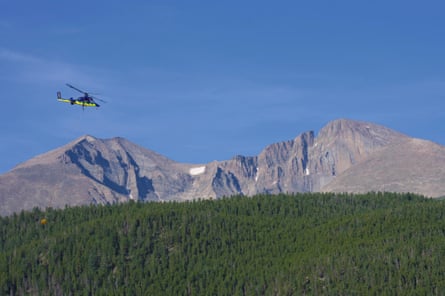
By 2015, rangers were trekking to the toilets and finding repulsive conditions. At its worst, the solid matter would freeze and thaw repeatedly and rise above the seat. Rangers would have to dig the material from the chamber and load it into a five-gallon bucket, place the cargo on to a pack animal and ride down.
“This is some of the worst work in the world,” said Geoff Hill, a toilet entrepreneur who worked with the park’s rangers as a doctoral student studying backcountry waste.
Because the toilets were in such a sordid state, many hikers probably refused to use them, opting instead to dig a shallow hole or cover their business with a rock.
Human pathogens can sully streams and harm high-altitude denizens, such as marmots. The beaver-like creatures would sometimes become stuck inside the toilet chambers and covered in waste, according to park staff.
Park chiefs poured time and resources into a solution. They settled on a nifty toilet product that Hill designed, called ToiletTech.
The system separates urine from solid waste, which creates cleaner excrement – and less work for rangers. Beneath the toilet seat, excrement lands on a small conveyor belt, while urine flows through a separate pipe and into a septic field. When a visitor presses a foot-powered pump inside the bathroom, ordure travels from the conveyor belt into its own chamber. There, it remains dry, lightweight and free of viruses usually present in a wet barrel of urine-soaked waste.
The new facilities, which replaced the four toilets near Longs Peak, have since helped cut down on solid matter in the area and made rangers’ lives much easier, although 200mph winds once blew the doors off a unit in the Boulder Field area.
Land managers have installed Hill’s toilets across the country to rave reviews, from Angel’s Landing in Utah’s Zion National Park to Terwilliger Hot Springs outside Portland, Oregon, as well as at Mt Rainier.
“If I was to win the lottery, I literally would go out … and buy enough toilets to work in all of the backcountry camps at Mt Rainier,” Lechleitner said of the new design.
But even Hill’s toilets come with drawbacks. Waste from remote areas is still flown out by helicopter, which is expensive. Lechleitner also said the ToiletTech units aren’t cheap, at $4,000 per unit, and National Park System maintenance upgrades are notoriously backlogged.

A helicopter delivers parts for new toilets installed near Longs Peak in Rocky Mountain national park, in 2018. Photograph: Courtesy Rick Sommerfeld
Mt Rainier is a petri dish for experiments in another, cheaper method of waste control: requiring climbers to carry their own excreta off the mountain when they’re not near bathrooms.
Land managers will either supply visitors with a kind of plastic bag – often containing an inner lining that seals and neutralizes some of the smell – or ask that they bring their own.
Advertisement
Merely asking hikers to carry their waste has helped protect Coyote Gulch, a maze of narrow canyons swarmed with backpackers in Utah’s Glen Canyon national recreation area, and other popular canyons. The dry environment means waste won’t degrade easily there, and the remote region only has one toilet, said the ranger Steve Henry.
“People are really opening up to the idea,” Henry said.
Plastic bags aren’t a perfect fix – they have to be incinerated at a cost to already cash-strapped agencies, or tossed in a landfill. And people generally don’t want to carry their own feces for days on end.
If a bathroom is still miles away and hikers don’t have a carry-out bag, the best thing they can is tote a trowel to a spot far from streams and trails, said Ben Lawhorn, director of education and research for the outdoor ethics group Leave No Trace.
“Once you get eight miles into the backcountry, it’s up to you to dig a hole,” Lawhorn said.
Mt Rainier is a petri dish for experiments in another, cheaper method of waste control: requiring climbers to carry their own excreta off the mountain when they’re not near bathrooms.
Land managers will either supply visitors with a kind of plastic bag – often containing an inner lining that seals and neutralizes some of the smell – or ask that they bring their own.
Advertisement
Merely asking hikers to carry their waste has helped protect Coyote Gulch, a maze of narrow canyons swarmed with backpackers in Utah’s Glen Canyon national recreation area, and other popular canyons. The dry environment means waste won’t degrade easily there, and the remote region only has one toilet, said the ranger Steve Henry.
“People are really opening up to the idea,” Henry said.
Plastic bags aren’t a perfect fix – they have to be incinerated at a cost to already cash-strapped agencies, or tossed in a landfill. And people generally don’t want to carry their own feces for days on end.
If a bathroom is still miles away and hikers don’t have a carry-out bag, the best thing they can is tote a trowel to a spot far from streams and trails, said Ben Lawhorn, director of education and research for the outdoor ethics group Leave No Trace.
“Once you get eight miles into the backcountry, it’s up to you to dig a hole,” Lawhorn said.
